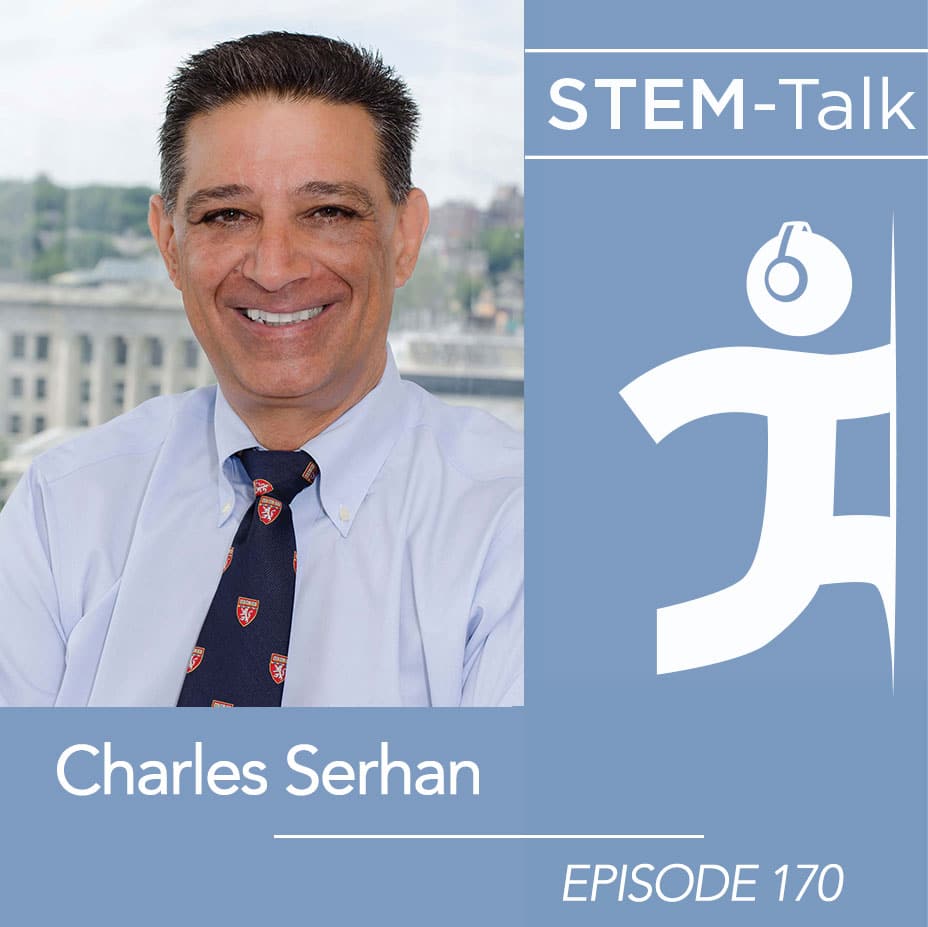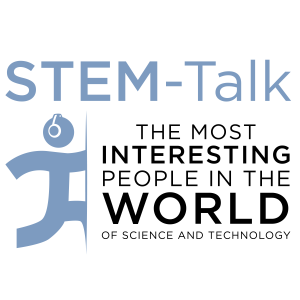
Episode 170: Charles Serhan on the use of specialized pro-resolving mediators to resolve inflammation
 2024-07-18
2024-07-18
Today Dr. David LeMay steps in to co-host with Dr. Ken Ford for our interview with Dr. Charles Serhan. Charles is a Harvard professor best known for his discovery of specialized pro-resolving mediators. SPMs are molecules that can activate the natural resolution of inflammation and help people avoid anti-inflammatory drugs. The discovery of SPMs spurred a paradigm shift in our understanding of inflammation and human disease.
Charles is the Simon Gelman Professor of Anesthesia at Harvard Medical School and the director of the Center for Experimental Therapeutics and Reperfusion Injury at Brigham and Women’s Hospital. He also is a co-director of the Brigham Research Institute.
David, who was our guest on Episode 69 of STEM-Talk, is a sports medicine and rehabilitation physician with a Pensacola, Florida practice that focuses on lifestyle and performance medicine. He also is a visiting research scientist here at IHMC.
Show notes
[00:03:33] David opens the interview mentioning that Charles grew up in New York City with a passion for music. David explains that Charles learned to play the vibraphone in junior high and played professionally for a year before going to college. David asks Charles why he decided to pursue science instead of music.
[00:04:22] Ken asks Charles what kind of vibraphone he plays.
[00:06:02] Ken asks, aside from the desire to help people, if there was something particular about studying science that Charles really enjoyed.
[00:06:45] David asks about Charles’ experience at the State University of New York at Stonybrook studying biochemistry and immunohistochemistry.
[00:07:16] David asks if there was any carry over of skills for Charles from his career in music to his career in science.
[00:08:16] Ken mentions that after Charles earned his bachelor’s degree, one of his professors persuaded him to go to New York University for a master’s and Ph.D. Ken also mentions that at the time Charles worked in the lab of Gerald Wiseman at Woods Hole Marine Biological Laboratory and asks about that experience.
[00:12:37] David asks if this experience led Charles to a focus on neutrophil membrane remodeling for his Ph.D.
[00:13:59] David asks Charles if it was at the Karolinska Institute where he met his future wife.
[00:14:38] Ken asks Charles about one of his mentors, Michael Heidelberg, who gave Charles advice about how to be a good scientist.
[00:17:13] David explains that in the 1990’s Charles discovered Specialized Pro-Resolution Mediators and has since pioneered a new field on the utility of SPMs for a variety of inflammatory diseases.
[00:25:01] Ken backs up to ask Charles what drew him to study inflammation in the first place and how that led him to do more research on the subject than any other scientist.
[00:26:26] David asks Charles to touch on some different types of inflammation that the body experiences.
[00:35:12] Ken asks Charles about how a trip to Asia during which he developed a hole in his intestines, resulted in first-hand experience on the importance of controlling inflammation.
[00:41:00] David asks if Charles was taking any non-steroidal anti-inflammatory medications when he developed peritonitis.
[00:41:53] David asks Charles to explain what non-steroidal anti-inflammatory medications do to the healing process.
[00:45:35] David brings up a recent discovery in animal models that as animals age, their ability to produce resolution mediators declines, possibly contributing to the loss of muscle mass with age.
[00:48:09] Ken asks Charles to talk about the explosion of research into the potential therapeutic applications of SPMs in the treatment of a variety of chronic diseases known to be driven in part by chronic inflammation.
[00:51:06] David asks Charles to explain the differences between resolvins, protectins, and maresins, as well as what role each plays in the healing process.
[00:56:04] Ken mentions a review article that Charles published in 2017 in the Journal of Molecular Aspects of Medicine, which looked at SPMs and their capacity to change pharmacology through resolution physiology.
[01:00:22] David asks Charles to explain the difference between inflammation and resolution.
[01:03:13] Ken asks Charles to give an overview of the research he is currently conducting at the Serhan Laboratory.
[01:05:50] David asks Charles about a paper he published last year in the Proceedings of National Academy of Sciences titled: “Resolvin D1 Prevents Injurious Neutrophil Swarming in Transplanted Lungs.” This provided insights for therapeutically enhancing pro-resolution pathways to minimize early leukocyte mediated tissue injury and promote healing following transplantation.
[01:08:43] David asks Charles if the aforementioned use of Resolvin D1 works for ailments such as ischemic stroke or ischemic myocardium after a cardiac event. Charles brings up a paper by Gabrielle Fredman that explored the use of resolvins to reduce inflammation in atherosclerosis.
[01:13:10] David mentions that Charles has three children, two of whom are in the military and asks for Charles’ thoughts on the use of SPMs in military populations.
[01:17:04] David asks Charles if there might be any protective effects of taking SPMs prior to or during exposure to extreme environments.
[01:17:48] Ken comments on Charles’ use of the phrase “nutritional armor,” coined by Joe Hibbeln. Charles talks about his experience working with Joe over the years.
[01:19:00] Ken recounts an experience when he was a member of the Defense Science Board and invited Joe Hibbeln to present his nutritional armor concept to the Board.
[01:22:05] David mentions that for the sports science world, recovery is a big focus. David asks if resolution is a more appropriate way to approach this issue than traditional anti-inflammatory interventions.
[01:23:33] David follows up asking Charles what the role of sleep is in resolution.
[01:24:57] David shares some of his experience using SPMs in his practice, and Ken mentions his own personal use of SPMs. Charles discusses how SPMs are derived and the importance of supplementation.
[01:31:04] Ken mentions that there were two books that Charles found very influential in his early career, “The Art of Scientific Investigation,” and “Men Like Gods.” Ken asks how these books impacted Charles, and if he still recommends them to young scientists and graduate students.
Links:
Charles Serhan bio
Learn more about IHMC
STEM-Talk homepage
Ken Ford bio
Ken Ford Wikipedia page
David LeMay bio
More Episodes
Create your
podcast in
minutes
- Full-featured podcast site
- Unlimited storage and bandwidth
- Comprehensive podcast stats
- Distribute to Apple Podcasts, Spotify, and more
- Make money with your podcast
It is Free
- Privacy Policy
- Cookie Policy
- Terms of Use
- Consent Preferences
- Copyright © 2015-2024 Podbean.com




